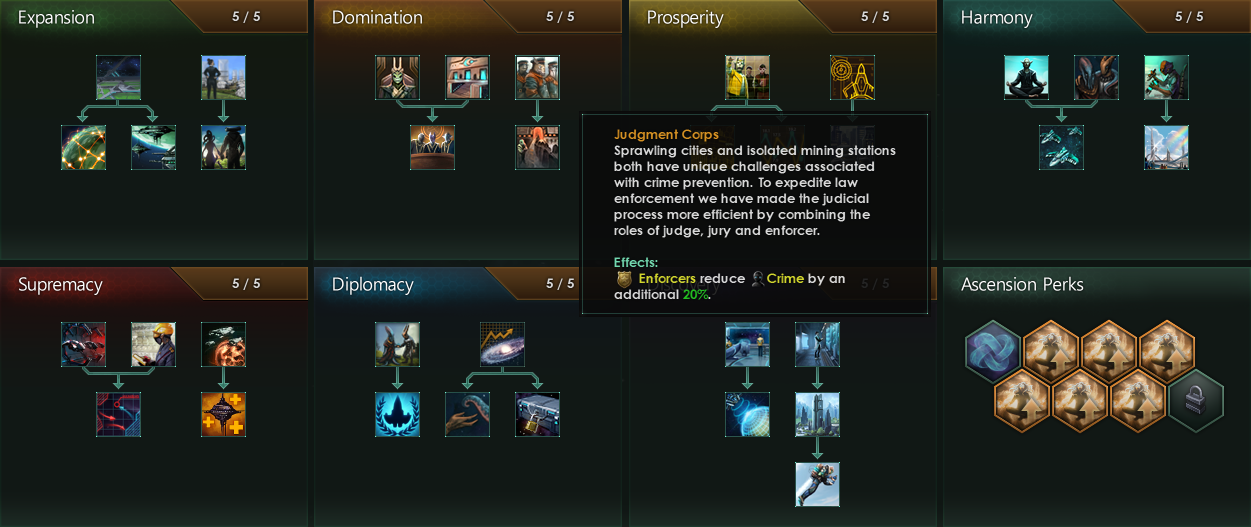Hello everyone! We’re back yet again for another Stellaris development diary. Today we're going to continue talking about the 2.2 'Le Guin' update, and as promised last week, the topic will be Decisions and Planetary Bombardment.
And before we get right into it I of course have to reiterate that we're not yet ready to reveal anything about when 2.2 ‘Le Guin’ is coming out, and that screenshots may contain placeholder art, interfaces and non-final numbers.
Decisions
Planetary edicts are gone - long live Decisions! Decisions is a new feature that will replace the old Planetary Edicts. We’ve always wanted to do more with planetary edicts, and Decisions now allow us to do a lot more cool stuff. Some Decisions can be enacted on any planet (colonizable or not) in your empire’s borders. Decisions can cost any resource, and can also require a certain amount of time to pass before the effect will take place. For example, the Mastery of Nature Ascension Perk now allows you access to Land Clearance – the Decision (see image below). Some Decisions will have toggle options – like for example Martial Law. Enacting the Martial Law Decision allows you to later on Revoke Martial Law should you wish to do so.

The system will be fully moddable and we’re looking forwards to seeing what cool stuff the community can come up with.
Planetary Bombardment & Devastation
To better fit with the new systems, bombardment has been slightly reworked.
When a planet gets bombarded it will suffer Devastation. Devastation ticks up from 0 up to 100, and is a direct penalty to your planet’s housing, amenities, trade value and pop growth. Clearing Devastation will take time and cost resources, as one would expect.
Fleets, as you know, have different Bombardment Stances – each with its own effect on how fast Devastation ticks up and how large chance there is for a Pop to be killed during bombardment. The higher the Devastation is on a planet, the higher the chance is for a Pop to be killed. When a building slot becomes invalid due to no longer having the amount of Pops required for it to operate, the building occupying it will become Ruined. A Ruined building may be repaired once the requirements of the building slot are once again met.

For those concerned that Devastation is too punishing, rest assured that we will be looking into that. Recovering from Devastation should never feel like an impossible task.
Next week our we will continue covering the features of the 2.2 ‘Le Guin’ update with the topic of Tradition rework. Because this week’s dev diary is a bit shorter, I’ll leave a teaser for next week. Enjoy!

And before we get right into it I of course have to reiterate that we're not yet ready to reveal anything about when 2.2 ‘Le Guin’ is coming out, and that screenshots may contain placeholder art, interfaces and non-final numbers.
Decisions
Planetary edicts are gone - long live Decisions! Decisions is a new feature that will replace the old Planetary Edicts. We’ve always wanted to do more with planetary edicts, and Decisions now allow us to do a lot more cool stuff. Some Decisions can be enacted on any planet (colonizable or not) in your empire’s borders. Decisions can cost any resource, and can also require a certain amount of time to pass before the effect will take place. For example, the Mastery of Nature Ascension Perk now allows you access to Land Clearance – the Decision (see image below). Some Decisions will have toggle options – like for example Martial Law. Enacting the Martial Law Decision allows you to later on Revoke Martial Law should you wish to do so.
The system will be fully moddable and we’re looking forwards to seeing what cool stuff the community can come up with.
Planetary Bombardment & Devastation
To better fit with the new systems, bombardment has been slightly reworked.
When a planet gets bombarded it will suffer Devastation. Devastation ticks up from 0 up to 100, and is a direct penalty to your planet’s housing, amenities, trade value and pop growth. Clearing Devastation will take time and cost resources, as one would expect.
Fleets, as you know, have different Bombardment Stances – each with its own effect on how fast Devastation ticks up and how large chance there is for a Pop to be killed during bombardment. The higher the Devastation is on a planet, the higher the chance is for a Pop to be killed. When a building slot becomes invalid due to no longer having the amount of Pops required for it to operate, the building occupying it will become Ruined. A Ruined building may be repaired once the requirements of the building slot are once again met.
For those concerned that Devastation is too punishing, rest assured that we will be looking into that. Recovering from Devastation should never feel like an impossible task.
Next week our we will continue covering the features of the 2.2 ‘Le Guin’ update with the topic of Tradition rework. Because this week’s dev diary is a bit shorter, I’ll leave a teaser for next week. Enjoy!


